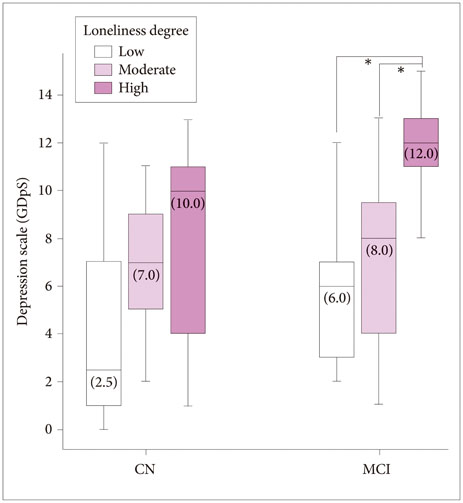Dement Neurocogn Disord.
2017 Dec;16(4):110-113. 10.12779/dnd.2017.16.4.110.
Loneliness in Elderly Patients with Mild Cognitive Impairment: A Pilot Study
- Affiliations
-
- 1Department of Neurology, Korea University Ansan Hospital, Korea University Medical College, Ansan, Korea. parkmuno@yahoo.co.kr
- KMID: 2442727
- DOI: http://doi.org/10.12779/dnd.2017.16.4.110
Abstract
- BACKGROUND AND PURPOSE
Loneliness is a significant concern among the elderly, particularly in societies with rapidly growing aging populations. While loneliness may influence neuropsychological function, the exact nature of the association between loneliness and neuropsychological function is poorly understood.
METHODS
We evaluated 50 elderly patients with mild cognitive impairment (MCI) and 33 without cognitive dysfunction with respect to demographics, clinical characteristics, cognitive and functional performance, depression scale, and loneliness scale. The associations between loneliness and neuropsychological assessments were evaluated.
RESULTS
Although loneliness was not associated with cognitive or functional performance, it was correlated with depression in elderly patients. For elderly patients with MCI, depressive symptoms were reported more frequently in individuals with a high degree of loneliness (p < 0.05).
CONCLUSIONS
Neither cognitive performance nor functional performance is associated with loneliness; however, loneliness is associated with depressive symptoms in elderly patients with MCI.
Figure
Reference
-
1. Boss L, Kang DH, Branson S. Loneliness and cognitive function in the older adult: a systematic review. Int Psychogeriatr. 2015; 27:541–553.
Article2. Cacioppo JT, Hawkley LC. Perceived social isolation and cognition. Trends Cogn Sci. 2009; 13:447–454.
Article3. Salthouse T. Consequences of age-related cognitive declines. Annu Rev Psychol. 2012; 63:201–226.
Article4. Wilson RS, Krueger KR, Arnold SE, Schneider JA, Kelly JF, Barnes LL, et al. Loneliness and risk of Alzheimer disease. Arch Gen Psychiatry. 2007; 64:234–240.
Article5. Tilvis RS, Kähönen-Väre MH, Jolkkonen J, Valvanne J, Pitkala KH, Strandberg TE. Predictors of cognitive decline and mortality of aged people over a 10-year period. J Gerontol A Biol Sci Med Sci. 2004; 59:268–274.
Article6. Lee SH, Won CW, Baek HS, Park KC, Kim BS, Choi HR, et al. Influence of loneliness on cognitive decline among elderly living alone in Korea: one year prospective study. J Korean Acad Fam Med. 2008; 29:695–701.7. Baek HS, Won CW, Choi HR, Kim BS. Loneliness and cognitive function in the elderly living alone: cross-sectional study. J Korean Geriatr Soc. 2007; 11:205–212.8. Winblad B, Palmer K, Kivipelto M, Jelic V, Fratiglioni L, Wahlund LO, et al. Mild cognitive impairment--beyond controversies, towards a consensus: report of the International Working Group on Mild Cognitive Impairment. J Intern Med. 2004; 256:240–246.
Article9. American Psychiatric Association. Diagnostic and Statistical Manual of Mental Disorders. 4th ed., text revision. Washington, DC: American Psychiatric Press;2000.10. Russell D, Peplau LA, Cutrona CE. The revised UCLA Loneliness Scale: concurrent and discriminant validity evidence. J Pers Soc Psychol. 1980; 39:472–480.
Article11. Kim OS. Korean version of the revised UCLA Loneliness Scale: reliability and validity test. J Nurs Acad Soc. 1997; 27:871–879.
Article12. Lee JH, Lee KU, Lee DY, Kim KW, Jhoo JH, Kim JH, et al. Development of the Korean version of the Consortium to Establish a Registry for Alzheimer's Disease Assessment Packet (CERAD-K): clinical and neuropsychological assessment batteries. J Gerontol B Psychol Sci Soc Sci. 2002; 57:P47–P53.
Article13. Han C, Jo SA, Jo I, Kim E, Park MH, Kang Y. An adaptation of the Korean mini-mental state examination (K-MMSE) in elderly Koreans: demographic influence and population-based norms (the AGE study). Arch Gerontol Geriatr. 2008; 47:302–310.
Article14. Kang Y, Park J, Yu KH, Lee BC. A reliability, validity, and normative study of the Korean-Montreal Cognitive Assessment (K-MoCA) as an instrument for screening of vascular cognitive impairment (VCI). Korean J Clin Psychol. 2009; 28:549–562.15. Ku HM, Kim JH, Kwon EJ, Kim SH, Lee HS, Ko HJ, et al. A study on the reliability and validity of Seoul-instrumental activities of daily livings (S-IADL). J Korean Neuropsychiatr Assoc. 2004; 43:189–199.16. Choi SH, Na DL, Lee BH, Hahm DS, Jeong JH, Yoon SJ, et al. Estimating the validity of the Korean version of expanded clinical dementia rating (CDR) scale. J Korean Neurol Assoc. 2001; 19:585–591.17. Jung IK, Kwak DI, Shin DK, Lee MS, Lee HS, Kim JY. A reliability and validity study of geriatric depression scale. J Korean Neuropsychiatr Assoc. 1997; 36:103–112.18. Perry GR. Loneliness and coping among tertiary-level adult cancer patients in the home. Cancer Nurs. 1990; 13:293–302.
Article19. Alpass FM, Neville S. Loneliness, health and depression in older males. Aging Ment Health. 2003; 7:212–216.
Article20. Theeke LA, Goins RT, Moore J, Campbell H. Loneliness, depression, social support, and quality of life in older chronically ill Appalachians. J Psychol. 2012; 146:155–171.
Article21. Cacioppo JT, Hawkley LC, Thisted RA. Perceived social isolation makes me sad: 5-year cross-lagged analyses of loneliness and depressive symptomatology in the Chicago Health, Aging, and Social Relations Study. Psychol Aging. 2010; 25:453–463.
Article22. Leyhe T, Reynolds CF 3rd, Melcher T, Linnemann C, Klöppel S, Blennow K, et al. A common challenge in older adults: classification, overlap, and therapy of depression and dementia. Alzheimers Dement. 2017; 13:59–71.
Article
- Full Text Links
- Actions
-
Cited
- CITED
-
- Close
- Share
- Similar articles
-
- Loneliness and Cognitive Function in the Elderly Living Alone: Cross-sectional Study
- Factors Affecting the Instrumental Activities of Daily Living of Elderly People with Mild Cognitive Impairment and Mild Dementia
- Anti-LGI1 Antibody Limbic Encephalitis Presented with Amnestic Mild Cognitive Impairment
- The Effects of Exercise-Cognitive Combined Dual-Task Program on Cognitive Function and Depression in Elderly with Mild Cognitive Impairment
- Epidemiology of Age-Associated Memory Impairment


